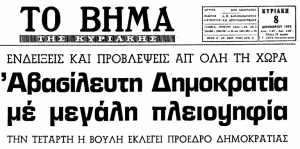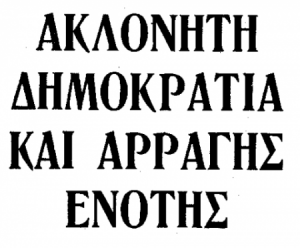December 9, 1974 was the first day after the abolition of the Greek monarchy.
Fifty years have passed since the referendum of December 8, 1974, which established the monarchy-free democracy.
Immediately after the fall of the Junta, on July 24, 1974 , one of the most important issues was the need to resolve the “regime issue”. That is, whether or not the regime of the reigning democracy would return to Greece. The Greek people gave the answer in a referendum on December 8, 1974.
According to the law of the Ministry of the Interior of the time, the pro-royal ballot paper “shall bear the words ‘ROYAL DEMOCRACY’ in capital letters of brown shade, and the pro-democratic ballot paper of “shall bear the words ‘NONROYAL DEMOCRACY’ in capital letters of green shade”.

The first parliamentary elections since 1964 had taken place 17 November 1974. Constantine Karamanlis and his newly formed New Democracy party were victorious. Andreas Papandreou’s PASOK, also newly reformed, also took part in the elections.
As the day of the referendum approached, the vast majority of political people were in favor of a Democracy. The cross-party ‘Panhellenic Committee for Democracy’ was formed, with dozens of members.
At the same time, Prime Minister Konstantinos Karamanlis put an obligation on the New Democracy party to maintain a neutral stance and asked New Democracy MPs “to refrain from any event for the monarchy”.
As To Vima reported then, for the first time in the history of Greece, there was no political party that officially supported the monarchy.
Constantine, the holder of the throne until the advent of the dictatorship, gave a speech from where he had been staying in London: “I have not for a moment ceased to care by every means and to strive with all my strength for the political liberation of the Fatherland. You will judge whether I have fulfilled my duty’.
On the morning of December 8, 75% of the electorate went to the polls and 69.18% voted for a democratic republic, while 30.82% voted for the monarchy.

On 10 December 1974, To Vima wrote in its editorial:
“A new state of affairs is created in Greece with the decisive victory of Democracy, which proves that the greatest majority of the Greek people means to govern itself, without granting dangerous privileges and rights to God’s supreme rulers,
“This verdict has put an end to an anomaly in public life which had been going on for over a century.
“Greece is thus freed from an anachronistic institution which, if it survives in some other European countries, is due to the fact that there the throne could not and would not interfere in the exercise of political power.
“But if the question of the regime were ever raised, it is certain that no European people would choose to retain the kingship.
“As for Greece, Sunday’s referendum cleared up a permanent point of division, of the falsification of our national independence and of unwarranted interference with the will of the electorate.
“The great thing is that this crucial achievement is being achieved FOR THE FIRST TIME in Greek history, with the unadulterated and unforced will of the people.
“For the first time the constitutional issue is resolved without the intervention of dynamic factors either for or against.
“For the first time it was neither arms nor intimidation that dictated whether the Throne would come or go.
“This very fact gives organic value to the solution of the Republic and makes it solid, immutable and unshakable. The nightmare of “divisions” over the Politeur is finally over.”

Michael Stasinopoulos, a judge and former president of the Council of State, was elected interim president of the Republic until the new Constitution was adopted, with 206 votes.
In June 1975, after the new Constitution had been adopted, the lawyer, philosopher and former minister Konstantinos Tsatsos was elected as the new President of the Republic, with 210 votes.



